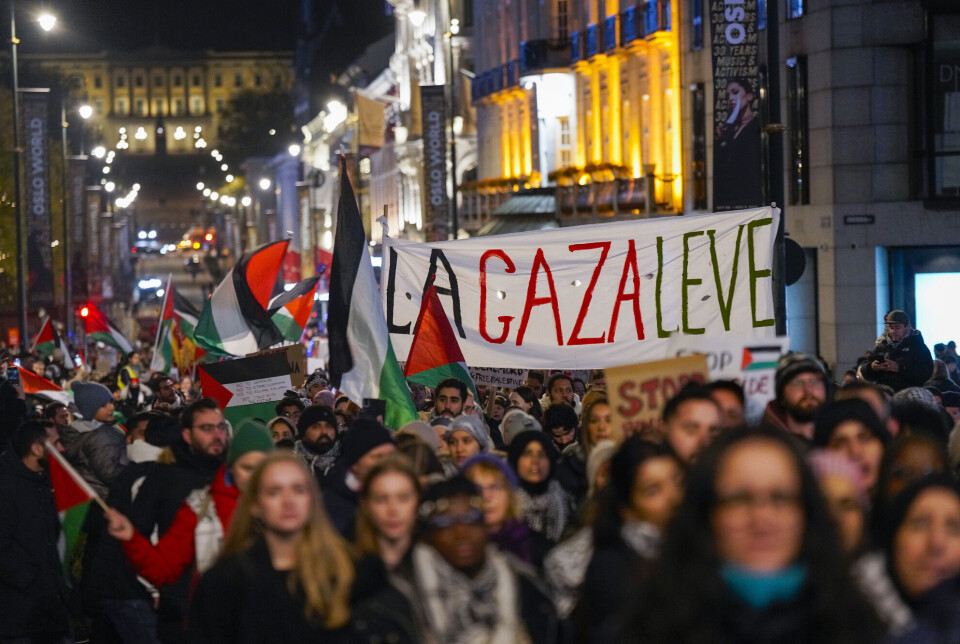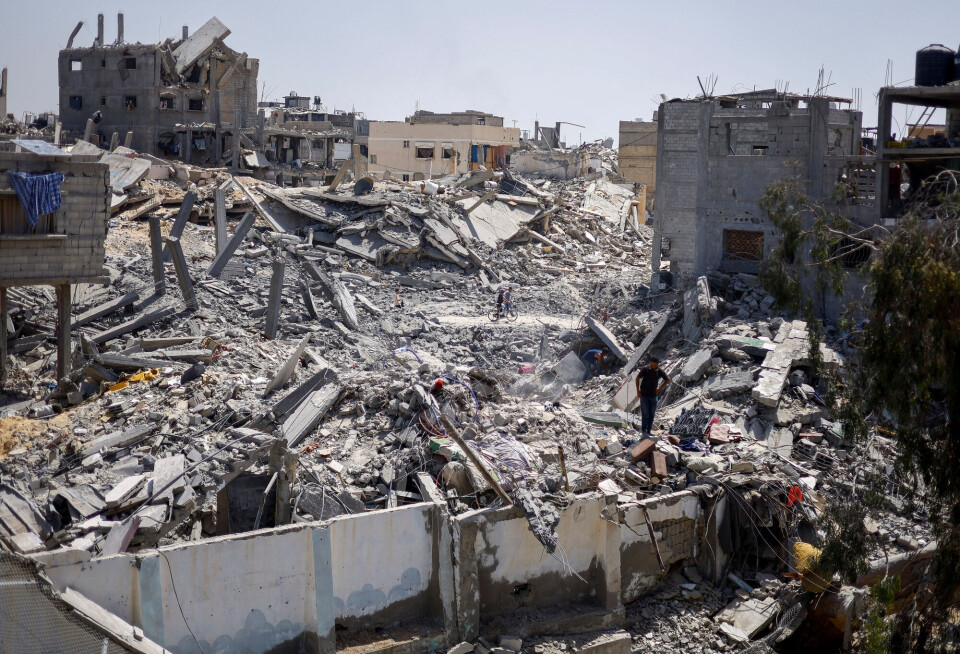
Middle East expert believes she knows why Israel is so open about its secrets
Hilde Henriksen Waage is not aware of any other country in the world that reveals so much negative and horrific information about itself. She thinks she has figured out why Israel does it.
Waage has packed her suitcase for yet another trip to the Middle East. This time to Beirut, together with her colleague Kristian Berg Harpviken. They are both researchers at the Peace Research Institute Oslo (PRIO).
However, they have both just been informed by the Norwegian embassy that it is not particularly advisable to travel. Much information indicates that a full war might break out between Israel and the Shia Muslim militia Hezbollah in Lebanon.
Waage is very disappointed. The trip was important for their research project.
At the same time, she is worried about the developments in the Middle East.
“What is Israel up to now? Are they going to have war on all fronts?” she asks.
Shouted and screamed about Israel
For 30 years, the historian at the University of Oslo has researched war and conflicts in the Middle East.
Her interest in Israel started early.
Hilde Henriksen Waage grew up in Southeastern Norway in the 1970s. Her parents were Christians. They were part of the Salvation Army in the city of Drammen. They believed in the Bible – and Israel.
“The somewhat special thing was that their very best friends, who were like an aunt and uncle to me, were members of the Socialist People's Party and the Palestine Committee,” she says.
There were some intense and loud discussions at the dinner parties in this bourgeois home in Drammen.
“They got incredibly worked up. They shouted and screamed when Israel was discussed,” she says.
Why did they get so passionately involved?
Waage wondered about this as a young girl. When she was to write her master's thesis in history a few years later, she remembered the engagement from her childhood home. She decided to find out.
A lot of emotion, less knowledge
Many have very strong opinions and feelings about this conflict in the Middle East. However, these strong opinions often do not match the knowledge of the conflict.
“This applies to both sides,” says Waage.

A common mistake people make is to talk about the Palestinians as a single party in the conflict, according to the historian.
“Many people are unaware of the significant division among the Palestinians. The vast chasm that exists between the Palestinian parties Fatah and Hamas,” she says.
“The Palestinians living in the West Bank and Gaza Strip are all occupied people. Apart from that, they have very different opinions on how the conflict should be resolved.”
Received numerous death threats
Waage has spent countless hours of her life in dusty archives to understand more about this conflict. She has done this in Oslo, London, Washington, and Jerusalem.
Much of what she has come across in these archives and published in numerous books and scientific articles has caused controversy.
“I’ve been seen as very controversial,” Waage says.
She admits that some of the reactions to her research have been a burden.
“I’ve received numerous death threats and serious accusations of anti-Semitism,” she says.
Something remarkable happened
Recently, Waage received the Communication Award from the University of Oslo.
“I thought it was very nice. Yes, I was moved by this recognition,” she says.
“A great deal has changed in Norwegian public discourse since Hamas attacked Israel on October 7 last year. Could you have received this award earlier?”
“I am a historian. I'm not too concerned with what could have happened. But I am no longer in the same storm. Now many more see the same things I have shown in my analyses for years – which, by the way, have never been academically controversial,” she says.
Most viewed
When Waage has tried to understand what has happened in the Middle East since the state of Israel was established in 1948, much has been about gaining access to secret documents.
Fortunately for the researcher, something remarkable happened in the 1980s. Israel decided to open large parts of its archive.
Why not classified?
Since then, the historian has often knocked on the door of the dusty state archives in Jerusalem. Here she has uncovered many remarkable documents, which among other things, reveal what Israel has been up to in peace negotiations.
“Documents show how incredibly skilled the Israelis have been in getting the world to go along with almost everything, just as they wanted it,” Waage believes.
“I’ve found so much in these archives. Here you can read overviews of Palestinian villages that were deliberately destroyed after 1948. The documents detail how many Palestinians were displaced, how many were liquidated, and they describe rapes,” she says.
Israel releases this information.
“I don't know of any other country in the world that reveals so much negative and horrific information about itself,” she says.
The historian has often asked herself why these documents have not been kept secret.
Now she believes she has found the answer.
“I think it’s because Israel wants to show the Palestinians, the Arab states, and the rest of the international community the following: If you mess with us, you will see what you get in return. What we can do to you. I have no other explanation,” says Waage.
A socialist paradise
In the 1940s, 50s, 60s, and 70s, there was considerable support for Israel both among the Norwegian population and the Norwegian authorities, explains Waage.
“Israel was seen by many on the political left as a socialist dream paradise after the state was established in 1948. Both the labour movement and Christian organisations admired the Israelis,” she says.
Hardly anyone cared about the Palestinians, according to the Middle East historian.

“They were seen as part of the Arab hordes threatening poor Israel,” says Waage.
After the Six-Day War in 1967, critical voices began to emerge. In just six days, Israel occupied an area three and a half times larger than the land they had been allocated through the United Nations Partition Plan for Palestine in 1947.
Then people started to ask: Was this really a small and weak country?
The next milestone came in 1982. Israel invaded Lebanon and turned a blind eye when a Christian-Lebanese militia massacred between 800 and 3,500 people in the Palestinian camps of Sabra and Shatila, Waage explains.
Norwegians react instinctively
After the war started in the Gaza Strip in October 2023, we now see massive support in Norway for the Palestinians' cause, Waage points out.
It is easy to explain, she believes.
“The atrocities of the war make Norwegians react instinctively. The extent of the abuses against the residents of the Gaza Strip is so vast,” she says.
Hamas attacked Israel on October 7, 2023. A few weeks later, Israel entered Gaza, searching for Hamas leaders and the Israeli hostages taken by Hamas.
Around 38,000 Palestinians may have been killed so far, according to Hamas-controlled health authorities. The UN agency for Palestinian refugees, UNRWA, believes there is reason to trust this number.

Horrible, but quite successful
In this war, Israel has lost on all fronts, summarises Waage.
“They have not eliminated Hamas. They have not brought the hostages home. They have not created safety and security for the Israeli population. And Israel is isolated in the world, with very little support,” she says.
On the other hand, Hamas has achieved several of its goals, according to the researcher.
“They have rightly been strongly condemned after the horrific terror attack. But Hamas has managed to draw the world’s attention to the plight of the Palestinians, which much of the world had largely forgotten. And Hamas has drawn the world's eyes on Israel's abuses against the Palestinians, not least in the Gaza Strip, but also in the West Bank,” says Waage.
The Middle East researcher fears that Hamas is willing to sacrifice large parts of the Gaza population to achieve its goals.
“Hamas is well underway and has cynically managed quite well so far. In that sense, this terror attack has been a horrible but quite successful campaign for Hamas,” she says.
Israel's best friend
In the post-war period, Norway has been Israel's best friend, according to Waage. This was also the title of her doctoral thesis.
In two later research works, she analysed what happened during the so-called Oslo process. These were the secret negotiations between Israel and the Palestine Liberation Organization (PLO) in the 1990s.
In Norway, we liked to believe that we had a strong role in these negotiations, according to Waage. That we were peacemakers who were on equally friendly terms with the Palestinians as with the Israelis.
“What had we achieved? What could we have achieved? These questions were completely absent. No one questioned what role Norway had played,” says Waage.
In the eye of the storm
Waage did, however, question this herself in her research on the Oslo process.
Here she could illuminate, with many sources, that Norway was not the bridge-building nation we had imagined ourselves to be.

Norway negotiated the Oslo Accords as Israel's errand boy, she claimed in interviews at the time.
Waage believed that Israeli negotiators had removed all references to a Palestinian state and Palestinian national rights from the agreement. Only crumbs were left for the Palestinians.
“The Norwegian negotiators tried to persuade Israel to choose the path of peace. It turned out to be completely unsuccessful. Israel did not listen to what Norway had to say,” she concluded.
This was not something the public or the authorities wanted to hear.
“It felt like I was standing alone in the middle of a storm. Everyone was angry with me for my studies on the peace process. They ruined the fairytale of Norway as a nation of peace. It almost made me think I should seek political asylum in Sweden,” she says.
A shift in Norwegian politics
Since the recent war in the Gaza Strip started, Norwegian public opinion has completely changed regarding Israel. This has caused the politicians to follow suit, Waage believes.
“Norwegian policy towards Israel is now entirely different from what it has been,” she says.
Recently, the Norwegian authorities decided to recognise the state of Palestine. ‘There can be no peace in the Middle East without a two-state solution. Peace in the Middle East requires a Palestinian state,’ Prime Minister Jonas Gahr Støre said.
The government does not admit that this is a shift in policy.
However, Waage believes it is a complete turnaround.
“Previously, Norway sided with Israel, not because we wanted to, but because Israel was the stronger party that needed to be persuaded to give up occupied land and pursue a peaceful solution,” she says.

The best of all bad solutions
Norway has now recognised Palestine, a state that currently does not exist.
Waage is sceptical. Is this really a good idea?
“Norway has chosen to support the weaker party, the Palestinians, along with other Arab and European countries. It remains to be seen if this new Norwegian policy will work. But we only have bad solutions to choose from. This might be the best of all the bad solutions we have,” she says.

A two-state solution with Palestine and Israel side by side seems more distant than ever, according to Waage.
“But recognising Palestine as a state is, in a way, a more morally high-ground policy that aligns much more with Norwegian public opinion,” she says.
Must happen by force
Neither the Palestinians nor the Israelis seem interested in living peacefully together. Therefore, a two-state solution must happen by forced, according to Waage.
“Hamas' horrific terrorist act has inflicted a great trauma on the Israeli population,” she says.
In the past, Israelis who wanted peace could gather hundreds of thousands of people in demonstrations for a two-state solution.
“The liberal voices I know in Israeli academia went silent after the terror attack in October last year. Now, these same people only talk about security for Israel and the need to crush Hamas,” she says.
A large part of the Israeli population has quickly moved to agree with the extreme, militant right in Israeli politics, the historian explains.
Hamas is stronger than ever
Among the Palestinians, the development is the same.
Polls among residents of the West Bank show that Hamas has significant support. On the Palestinian side as well, there are few moderate voices left wanting a compromise with Israel, Waage explains.
“We don’t know the situation in the Gaza Strip. But both there and in the West Bank, there are many small political groups far more extreme than Hamas. They appeal to young people who have given up. Young people who think they might as well die in the fight against Israel because they don’t have a life worth living anyway,” she says.
The only solution Waage can see is for European countries, wealthy Arab countries, and the USA to force through a two-state solution.
“This would involve a Palestinian transitional government, installed by us. Something like that is, of course, problematic from a democratic standpoint. But democracy and human rights are not really part of the reality in the Middle East,” she says.
The new anti-Semitism
Many express concern today that hatred of Jews is resurfacing because of Israel's warfare in Gaza.
Waage is worried about what she calls the ‘new anti-Semitism.’
“Because of Israel's policies, many people fail to distinguish between the state's actions and its people. This confusion revives old prejudices against Jews,” she says.
Middle East researchers are concerned that hatred of Israel is now spreading worldwide.
“One aspect is the immense suffering of Palestinians in this war. But how does Israel intend to coexist in the Middle East after the conflict ends? Israel will soon have no friends left. That’s the big question now,” she says.
———
Translated by Alette Bjordal Gjellesvik
Read the Norwegian version of this article on forskning.no







































